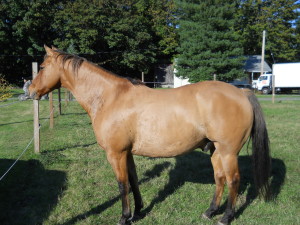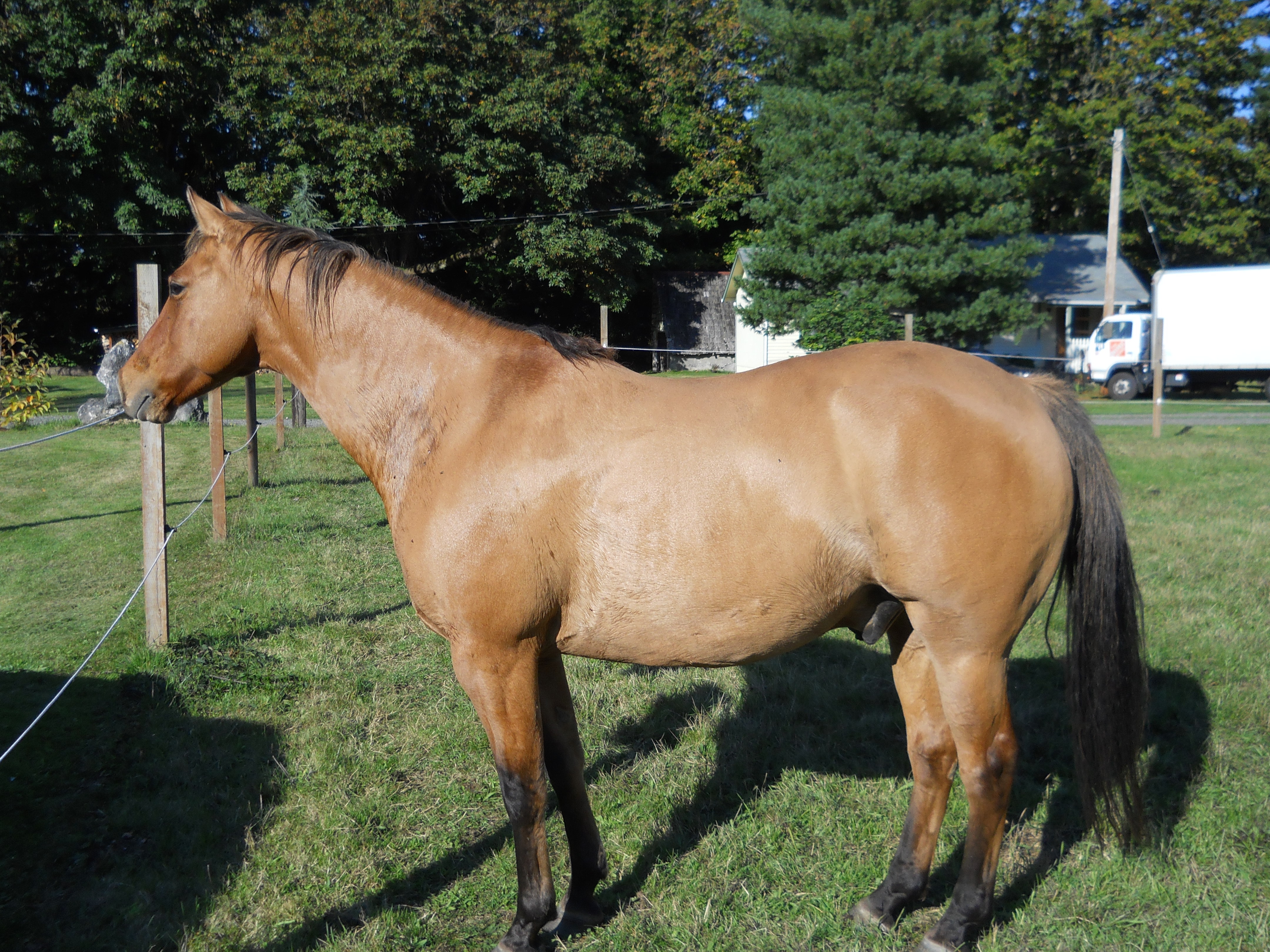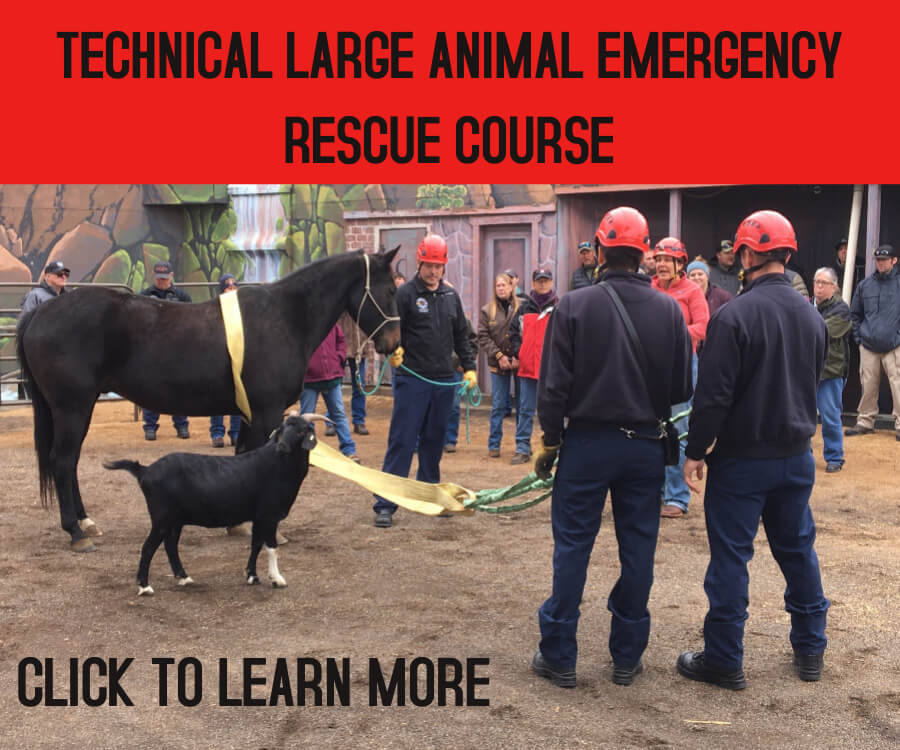True Causes of Obesity and How to Fix It
by Juliet M. Getty, Ph.D.
Obesity is an epidemic problem with domesticated horses. Although we most easily attribute the problem to overfeeding concentrates combined with too little exercise, the underlying cause is much less apparent. It has to do with the horse’s brain and his response to stress, a chronic low-grade, inflammatory stress.

Stress and Safety
Discomfort, from any source, induces a bio-chemical response in the brain that triggers the horse to do whatever he can to survive. Research with a variety of species has repeatedly shown that stress tells the body to hold on to fat; the chemical changes that occur are similar to those produced during a famine. This is based on a primitive need to feel safe. Therefore, stress “tricks” the horse’s body into gaining weight to survive. Stress can come from many sources including stall confinement, isolation, change in environment, travel, excessive training and performing, pain and illness and the most stressful of all, not being allowed to graze on forage at all times. Forage restriction is incredibly stressful. Putting the horse on a “diet” by limiting the amount of hay he can have will create a chain of chemical reactions that prevent the very outcome the diet was meant to ensure.
Stress causes the adrenal gland to release the hormone cortisol. Cortisol tells the tissues to ignore insulin’s attempts to get glucose into the cells. Insulin then increases to try to overcome this, but not very successfully. When insulin is elevated, the cells hold on to body fat. And when body fat increases, it releases a hormone called leptin. Normally, leptin is a good thing, but not in this case because the brain can become resistant to leptin. Under normal circumstances, leptin (secreted from fat tissue), goes to the satiety center in the hypothalamus portion of the brain to tell it that the horse has had enough to eat and is satisfied. This is the body’s way of maintaining normal weight: fat increases, leptin rises, the brain says the body has had enough to eat, and weight comes down.
The excess body fat of obese horses promotes inflammation through its secretion of substances known as cytokines. Cytokines can damage the areas within the hypothalamus that recognize leptin. Leptin is high, but the brain is not responding to it. The result? The appetite does not decrease; instead the horse keeps on eating, getting more obese, producing more cytokines, increasing inflammatory damage to the hypothalamus, resulting in greater leptin resistance.
Perhaps you’ve had your horse’s cortisol level checked and it is normal. You assume that stress is therefore not an issue, but this can lead to a false assumption. Cortisol can actually be elevated inside the cell and not in the bloodstream, due to the over-expression of an enzyme called 11-beta-hydroxysteroid-dehydrogenase-1, present in fat, liver and brain cells that produce active cortisol. This has been shown in several species, including horses, and leads to the vicious cycle resulting in hypothalamic damage.
Elevated cortisol can reduce T4 levels leading one to believe that thyroid medication is necessary. But reduced T4 under this circumstance is not an indication that the thyroid gland is underactive, nor is it an indication that more thyroid medication is needed to help the horse lose weight. Furthermore, adding T4 to the diet will not do any good if the horse is stressed, simply because excess cortisol interferes with the conversion of T4 to T3, the active hormonal form.
The Forage Fix
Some horses have suffered from forage restriction for so many years that their metabolic rate has become severely impaired. For these, modest, short-term weight gain can be a consequence of free-choice feeding. Be patient. The transition can take several months. Allow your horse time to become accustomed—both physically and psychologically—to this new way of eating. Healthy weight loss takes time. When fed following the steps outlined below, the large majority of horses, even those grossly overweight, will adjust, lose weight and in time, arrive at a healthy body condition. The leptin resistant horse will, first and foremost, have excess body fat. His appetite will seem insatiable and he will rarely lift his head from eating. His metabolic rate is sluggish, causing him to pack on the pounds very easily. He is reluctant to move and his energy level is low. What is important is to reduce inflammation! Three factors to consider:
1) Stress reduction will calm down the cascade of hormonal events that tell the body to hoard fat.
2) Less body fat will create fewer inflammatory substances. Insulin (an inflammatory hormone) will also decline.
3) Less inflammation will help the hypothalamus return to a normal leptin response.

It is important to understand that once the horse loses body fat the brain will initially remain leptin resistant, making the horse very hungry so he could gain back all the weight. Therefore, the approach must be to heal the inflammation signaling the hypothalamus. To do this consider the following:
Never let your horse run out of forage, not even for a few minutes
Not only is free-choice forage feeding critical to your horse’s overall health, it also increases the metabolic rate. Feed appropriate hay and/or pasture that is low in calories, sugar, and starch.
Add a comprehensive vitamin/mineral supplement to hay-based diets
It fills in nutritional gaps and reduces overeating to simply obtain enough nutrients.
Avoid processed foods
These can contain inflammatory preservatives and omega 6 fatty acids (typically from soybean and corn oils). Omega 6 oils are also highly inflammatory.
Feed whole foods free of additives and toxins
Whole foods can include non-GMO beet pulp, alfalfa, hay pellets, copra meal, split peas, hemp seeds, ground flaxseeds, chia seeds, blue-green algae, and various fruits and vegetables. Limit soybean meal as the long term impact of isoflavones (the phytoestrogen found in soy) on the thyroid gland is controversial.
Feed a variety of protein sources by mixing grasses and adding whole foodsWhen only one or two sources of protein are fed, the excess amino acids can be converted to glucose, potentially increasing insulin.
Eliminate excess sugar and starch
These include sweetened feeds, cereal grains, wheat middlings, and rice bran. They raise insulin as well as triglycerides. Triglycerides can bind to leptin in the blood stream and prevent it from signaling satiety to the brain.
Increase omega 3’s
Feed ground flaxseeds or chia seeds. Fish oils can be included in cases of high levels of inflammation.
Add antioxidants
These include vitamins E and C, beta carotene (vitamin A), lipoic acid, grapeseed extract, green tea extract, spirulina, as well as herbs including turmeric, boswellia, and ashwaghanda (which is particularly useful in combating stress).
Add a probiotic for digestive health
Horses who graze on pasture will naturally consume a variety of microbes. Hay-based diets, however, may not offer enough microbes for proper digestion of forage. Stress can also disrupt the horse’s normal microbial flora.
Allow for movement and reduce stall confinement
Exercise increases insulin sensitivity and lessens inflammatory cytokines. It has also been shown to directly reduce hypothalamic inflammation. Horses that have room to roam can be as fit as those who receive daily focused exercise, and they are under far less stress.
Limit grazing muzzles
They can defeat the purpose if they cause stress. They should be limited to no more than 3 hours per day because the digestive tract needs more forage than they allow.
Consider slow feeders
Not all horses require them, but they are helpful initially to allow for slowing down intake.
Many barn owners are reluctant to feed hay free-choice because of the apparent expense involved in purchasing more hay. But in actuality, horses that are permitted to self-regulate their intake will eat less. It’s only when several hours lapse between feeding that they eat very quickly and consume everything in sight. But when they get the message that hay is always available, that they can walk away from it and it will still be there when they return, they will eat just what their bodies need to maintain a healthy weight.
Even a horse that was once obese can graze on pasture again. Living, healthy grass is the best whole food around and grazing in the open air is the best stress reducer for your horse. The amount of grazing depends on your horse’s individual condition. Yes, pasture can be high in sugar and starch, but it can vary depending on the month, the time of day, level of rainfall, sunlight, etc. Get to know your pasture grasses.
The Bottom Line
Turn off the body’s fat hoarding response by taking measures to reduce stress. Combine this with an anti-inflammatory diet and increased movement and your horse’s brain will regain its ability to respond properly to leptin. Taking off weight will become much easier and your horse will be healthier.
Juliet M. Getty, Ph.D. is an internationally respected, independent equine nutritionist who believes that optimizing horse health comes from understanding how the horse’s physiology and instincts determine the correct feeding and nutrition practices. She is available for private consultations and speaking engagements. gettyequinenutrition.com.

Juliet M. Getty, Ph.D. is an independent equine nutritionist with a wide U.S. and international following. Her research-based approach optimizes equine health by aligning physiology and instincts with correct feeding and nutrition practices. Dr. Getty’s goal is to empower the horseperson with the confidence and knowledge to provide the best nutrition for his or her horse’s needs. Learn more at www.gettyequinenutrition.com.





